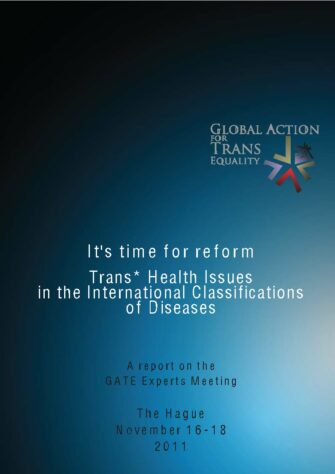This document is aimed at giving an overview of the discussions that were held at the Experts Meeting organized by GATE – Global Action for Trans Equality. Invited by GATE, a group of more than 20 experts from most parts of the world met at the Dutch Ministry for Education, Culture and Science on November 16-18. The goal of the meeting was to explore alternative concepts to discuss alternative models for trans health classifications in the International Classification of Diseases (ICD-10), with the purpose of introducing new perspectives, analysis and references in the WHO process of producing the ICD-11. Participants came from India, Venezuela, New Zealand, Brazil, Spain, Switzerland, Sweden, China, USA, Thailand, Argentina, Great Britain, Lebanon and the Netherlands, and work in the fields of human rights, medicine, advocacy, as well as other related areas. Most experts also self-identify as trans.
Recommendations
At this point in the debates around these issues, GATE does not have a formal proposal to submit to the World Health Organization in regard to how trans specific and general health care issues should be included in the ICD-11. However, we do have some recommendations in regard to the process of including them:
- Trans people from around the world must be actively involved in the process of defining and including their health care needs in the context of ICD 11. Trans people’s expertise must not be disregarded, ignored or excluded.
- ICD-11 references (chapters, blocks, codes) should avoid pathologizing trans people’s experiences of gender identity, gender expression, body diversity and sexuality. This recommendation applies particularly to those references potentially affecting adolescents and children. Instead the focus should be on the medical needs of trans people.
- Trans individuals must be called by their self-perceived gender identity, even in the context of references addressing bio-anatomical features or the gendering of body parts should be removed.
- ICD-11 references should apply only to those trans people that need health care, and only for the time they need it, avoiding any codification of trans experiences in general as susceptible or in need of diagnosis.
- Given its global impact, ICD-11 references must take into account different cultural contexts and avoid any codification of trans experiences in Global North / Western terms, especially terms that assume binary, mutually-exclusive genders, such as male/female.
- Even when the ICD is intrinsically based on a clinical logic, we truly believe that this logic can be expanded to include depathologizing approaches to trans health issues and, therefore, we encourage the WHO experts’ working group to move in that direction.
GATE’s involvement in the process of the ICD revision and reform, including the organization of the Experts Meeting in The Hague, the production of this report and follow-up activities, is possible thanks to the support of the Dutch Government, the Open Society Foundations, and an anonymous donor.






